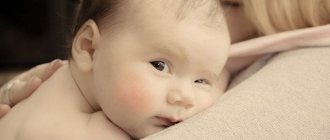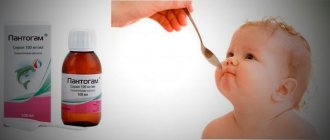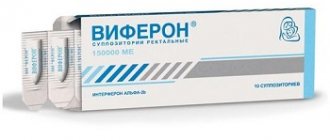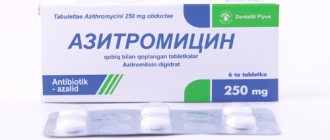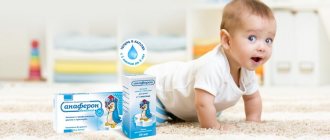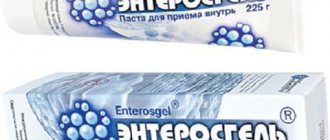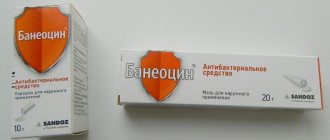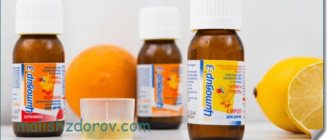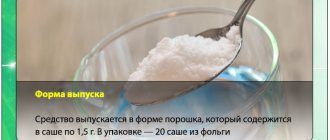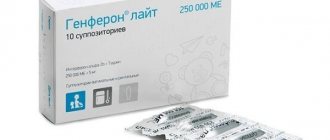In drops
The drug is produced in drops by a Swiss pharmaceutical company.
The active substance is dimethindene maleate. Fenistil is a histamine antagonist with H1 receptor blocking. The drug is released in a 20 ml bottle. There is a special dropper nozzle on the surface of the lid, which improves the ease of use for newborn children. The contents of the bottle have a pleasant taste, so children can be given the drug undiluted.
Fenistil drops are intended for children from 1 month of age. The effect of taking the medication is visible after 30 minutes, the duration of exposure is 6 hours. Indications for use:
- diseases of an allergic nature (urticaria, diathesis, food allergies);
- infectious diseases accompanied by itching and rashes (chickenpox, measles, rubella);
- atopic dermatitis;
- itchy dermatoses;
- insect bites.
The antihistamine is contraindicated in children under one month of age and in infants diagnosed with chronic obstructive pulmonary disease - the pronounced sedative effect of the drug can cause sleep apnea.
Indications for use
The use of the drug helps to quickly relieve unpleasant symptoms
Fenistil is one of the safe and effective antihistamine drugs. The drug appeared in pharmacies recently, pushing the well-known Suprastin and Tavegil onto the shelves.
Fenistil is available in the form of drops or gel. The form of drops, which is more convenient for babies, allows you to quickly eliminate local symptoms. The concentration of the active enzyme of the drug is 0.1%.
An antihistamine drug is effective for:
- skin urticaria;
- allergic rhinitis;
- atopic dermatitis;
- pollylose;
- food and drug allergies;
- serum sickness;
- allergies after vaccination or vaccination.
It is recommended to use Fenistil-gel as an antipruritic agent.
Allergic manifestations in the form of red rashes in infants are called rubella. It represents the body’s irritation to a substance perceived as an “enemy.” In opposition to the foreign element, the immune system synthesizes antibodies.
When the “enemy” meets again, histamine is produced and released into the blood, causing itching, swelling and redness of the skin in babies.
Fenistil drugs block receptors of cells responsible for sensitivity to histamine. In addition, the components of the drug:
- reduce the throughput activity of capillaries for biologically active substances;
- have ankytinic and anticholinergic effects - they reduce inflammation and pain, reduce the speed of nerve impulses, which helps relieve itching.
The medicine in drop-shaped form has similar qualities, however, the medicine for internal use has a comprehensive and complete effect on the body. The effectiveness of the drops appears two hours after administration, and after six hours they are completely eliminated. The effect of the gel occurs more quickly - 15 minutes after application, the patient feels the effect of pain relief and reduction of itching. Only 10% of the external medication penetrates into the blood fluid.
As a gel
The main active ingredient is dimethindene. The medicine is available in tubes of 30 and 100 g at a dosage of 0.1%. Excipients include purified water, propylene glycol, sodium hydroxide solution, benzalkonium chloride, edetate disodium.
Fenistil-gel, due to its base, has an antikinin effect. The maximum effect lasts up to 4 hours, and the onset of action of the drug takes several minutes. In addition, the gel has a cooling effect, which almost instantly eliminates itching of the skin.
The antihistamine has a local anesthetic effect, it relieves irritation caused by allergic skin reactions and anesthetizes the bite site. The gel is used in both adults and children older than one month. When using the drug, it is important to avoid prolonged exposure to direct sunlight.
In newborns, the gel is contraindicated in cases of extensive skin lesions and bleeding wounds. Rash and skin itching caused by cholestasis (often occurs in premature babies) do not disappear after using Fenistil gel, since it is not an m-choline receptor blocker.
Drug interactions
The instructions indicate that simultaneous use of an MAO inhibitor and Fenistil can potentiate sedative and anticholinergic effects.
The combined use of the drug and sleeping pills, as well as tranquilizers, can cause drowsiness and uncoordinated movements.
Ethanol may enhance the sedative effect of the drug.
When using a tricyclic antidepressant and anticholinergics together, urinary retention and the development of glaucoma are possible.
Emulsion
Another form of release of the antihistamine medication is a bottle with dimetindenene maleate emulsion. The emulsion has the same local anesthetic and cooling effect as Fenistil-gel. The emulsion base of the product softens and moisturizes the affected skin surface. Most often, the emulsion is used for insect bites, less often for mild sunburn. The convenient form of the drug allows you to take it on vacation and, in the event of a bite, instantly reduce the pain threshold, preventing the development of irritation.
Why do doctors prescribe it to newborns?
Young children should not be given antihistamines without a doctor's prescription. Only a doctor can assess the child’s condition and prescribe the right solution to the problem. Fenistil in drops takes a leading place when prescribing an antiallergic drug to a child of one month of age. The drug is popular in pediatric practice because it is safer for infants, there are no side effects, and the elimination of allergy symptoms is observed instantly.
According to experts, Fenistil gel has the following advantages:
- relieves itching well;
- convenient release form;
- the drug is absolutely safe;
- The dosage regimen allows the drug to be used by young children.
Advantages of Fenistil drops:
- lack of pronounced sedation;
- allowed for children over one month of age;
- correspondence between price and quality;
- pleasant taste.
Overdose
If the dosage is violated or Fenistil is used incorrectly, the following symptoms may occur:
- children most often experience nervous agitation, hallucinations, various types of convulsions, tachycardia, fever;
- adult patients may experience fatigue, drowsiness, and a drop in blood pressure;
- urinary retention, increased dryness of the mucous membranes, and ataxia often occur;
- sometimes a collaptoid state may develop, in which the patient may die from cessation of respiratory activity and the vasomotor center.
It is important to note that an antidote for Fenistil has not been found, therefore, in case of overdose, symptomatic therapy is carried out aimed at relieving intoxication and actively supporting cardiac activity.
Why do doctors prefer this drug?
Fenistil is the newest antihistamine for the treatment and elimination of allergy symptoms.
It helps not only in the treatment of an autoimmune pathological process, but also improves the immunity of the newborn. Doctors consider it an ideal antihistamine, since the gel or drops can be used at the first symptoms of allergies in infants, unlike first-generation antihistamines.
Doctors advise including drops and its gel form in your home first aid kit, and taking Fenistil emulsion with you on walks in the warm season. To prevent the development of anaphylactic shock, Fenistil is prescribed when vaccinating a newborn - before and after vaccination injections.
Of course, the allergy drug has a number of side effects, but to prevent their development, experts recommend adhering to an individual dosage and administration regimen. If you have an individual intolerance to one of the components of the drug or if the baby develops hypersensitivity, you must stop taking the antihistamine.
Negative reactions to Fenistil
The drug may cause adverse reactions
The drug can cause the following adverse reactions:
- drowsiness or hyperexcitability;
- the appearance of edema, an increase in the volume of the rash;
- dizziness;
- the appearance of causeless excitement;
- excessive dryness of mucous tissues;
- Infants up to one year may hold their breath.
The manifestation of such symptoms occurs rarely, it is important to remember them and monitor the baby’s condition after taking the medication.
Instructions for use
Fenistil drops are prescribed not only for the development of allergies, but also for various diseases of infectious etiology.
The drug is dosed according to the age and weight of the baby - for every kilogram of the child’s weight there are 2 drops of the drug. The daily dose should not exceed 30 drops. The prescribed number of drops should be divided into several doses. In infancy, the drug is diluted in formula or milk.
The active ingredient in Fenistil, dimethindene, does not tolerate high temperatures and is destroyed, so adding it to hot mixtures and porridges is not recommended. For about 1 year, the medicine should be given undiluted, from a spoon, giving the opportunity to wash it down with water.
- For allergic reactions:
| Age | Dosage per day (approx.) | Admission course |
| 1 month | 4-6 drops | 7 days |
| 2-4 months | 8-12 drops | No more than 10 days |
| 4-6 months | 14-20 drops | 7-10 days |
| 6-9 months | 20-22 drops | 7-10 days |
| From 9 months to 1 year | 22-28-30 drops | No more than 7 days |
- Vaccination.
Vaccinations are weakened viruses that become a trigger for the production of antibodies and immunoglobulins. Vaccination injections are a stressful condition for the body, and protein agents cause the development of allergies. Fenistil is prescribed 4-6 drops 3-5 days before vaccinations, twice a day. And 1-2 days after vaccination, with favorable recovery of the child’s body.
- Infectious diseases.
Measles, chickenpox, rubella are diseases that occur in childhood. Children under one year of age get sick with them extremely rarely, but in case of illness, in addition to specific treatment, antihistamines are prescribed, such as Fenistil: 3-4 drops 2 times a day. (!) An antihistamine does not cure infectious diseases - it is maintenance therapy and has no meaning without primary treatment.
Contraindications for taking the medicine:
- age less than 1 month;
- if the child is premature, then the period for permission to receive it is 3 months from the date of birth;
- any disease of the newborn's bladder (acute or chronic forms).
Contraindications to the use of the drug Fenistil
The drug should be taken only after consulting a doctor
The medication should be taken only after consulting a doctor. The list of contraindications to the use of Fenistil includes:
- Susceptibility to one of the components of the drug.
- Lung diseases.
- Bronchial asthma.
- Glaucoma.
- Diseases of the urinary system.
Fenistil has a strong effect and actively penetrates the circulatory system. For this reason, the medication cannot be used for newborns, under 1 month of age, for pregnant women and women during lactation.
Instructions for use of the gel in infants
The gel form of the drug is widely used to relieve itching after insect bites, and is also part of the treatment of childhood diathesis.
Instructions for use of the drug for various pathological conditions:
- Diathesis. Rashes on a child’s skin associated with food allergies can be lubricated with Fenistil gel if the affected area is small. The gel should not be used for bleeding or inflamed wounds. The drug is applied to the child’s pimples pointwise, no more than 2 times a day under the age of six months, and over 6 months, 2 times a day.
- Insect bites. The bite is lubricated with gel 2-4 times a day. If there are several damaged areas (for example, after a mosquito “invasion”), then you can use the oral route of administration in tandem using a gel.
Using the gel form in rare cases can cause side effects such as dry skin, burning sensation or tightening of the epidermis.
Contraindications include:
- hypersensitivity to the components included in the drug;
- prematurity;
- children's age (the gel can be used from 2 months of age).
special instructions
When the dose is increased or there is a contraindication, the possibility of side effects increases: lethargy, dizziness, drying out of the internal membranes, skin rash and tissue swelling.
Some patients experience sleep apnea (temporary cessation of breathing) for up to 12 months. After applying the gel, the skin may dry out, burning, itching, and rash may occur.
With very long-term use, the possibility of seizures and heart rhythm disturbances increases, the child becomes lethargic, motor activity decreases, and reflexes are dulled.
If similar symptoms occur in your baby, you must stop taking the pharmaceutical and contact your pediatrician.
It is not recommended to combine Fenistil with products with a hypnotic or sedative effect, as side effects become more pronounced.
Parents' opinion
Reviews of women who treated children with Fenistil gel:
After the introduction of new complementary foods, a rash appeared on the child’s cheeks. I used creams and ointments - it didn’t help. They changed their diet, bathed in herbs - no effect. As a result, I went to see a dermatologist. She recommended Fenistil to me. At first, according to the doctor’s regimen, we drank drops - everything went away. Now, if any pimple or spot appears, I apply Fenistil gel, and everything goes away instantly.
Irina Kovalkova
I don’t know how we used to escape allergies without Fenistil. Everyone in our family suffers from allergies, so our granddaughter adopted our “pathology” after birth. She broke out a lot when she was still breastfed. The daughter was put on a hypoallergenic diet, but the granddaughter’s diathesis did not go away. On the doctor's advice, we tried Fenistil. Now our entire family rarely worries about allergies. I believe that this drug is the most effective. Although his price is steep, he is the only one that helped us cope with childhood allergies.
Victoria Vasilievna
One evening a child (4 months old) was bitten by mosquitoes. The bites were swollen and inflamed. I noticed that in addition to the bites, the child became capricious and whiny. On the advice of a friend, I treated all the bitten areas with Fenistil gel. After a few minutes he calmed down and fell asleep. To consolidate the result, I lubricated the bites again at night. I was very pleased with the result - there was no trace left of the bites. Now I always have Fenistil in my medicine cabinet.
Zinaida R.
